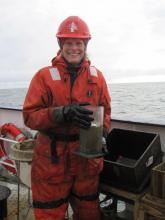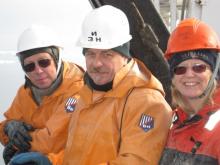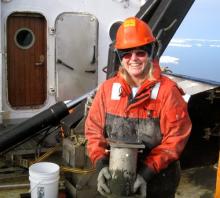Update
Find more blogs here! You can also follow blogs regarding this expedition at NOAA Ocean Explorer
What Are They Doing?

These seas and the life within them are biologically rich and are thought to be particularly sensitive to global climate change because they are in areas where steep thermohaline and nutrient gradients in the ocean coincide with steep thermal gradients in the atmosphere. The Bering Strait acts as the only Pacific gateway into and out of the Arctic Ocean and as such is critical for the flux of heat between the Arctic and the rest of the world. One of the overall goals of the entire project was to monitor the flux of fresh and salt water in the region and to establish benchmark information about the distribution and migration patterns of the biologically rich life in these seas. Dr. Grebmeier's research on this final cruise of the project was particularly focused on benthic biological communities and their associated sediment chemistry.
Where Are They?

Latest Journals

Jacqueline Grebmeier is currently a research professor at the University of Maryland Center for Environmental Sciences (Chesapeake Biological Laboratory). Over the last 25 years, her arctic field research program has focused on such topics as understanding biological productivity in arctic waters and sediments, and documenting longer-term trends in ecosystem health of arctic continental shelves, including studying the importance of bottom dwelling organisms to higher levels of the arctic food web, such as walrus, gray whale, and diving sea ducks. Dr. Grebmeier has served on numerous advisory committees and research boards, and has coordinated and participated in numerous international research projects. Dr. Grebmeier has been involved with numerous teacher experience and education programs in the Arctic, including hosting TREC teachers in 2004, 2006 and PolarTREC in 2007.





